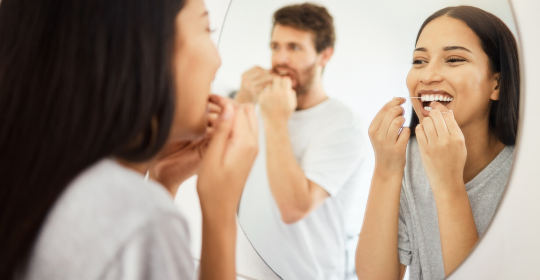 01 May 2023
01 May 2023
Most of us have become familiar with the increased cost of living, especially in recent times. While it’s true that the cost of living has been rising, there’s one area where being proactive can actually save you money in the long run – your oral health.
The reality is that many oral health conditions, if left undiagnosed and untreated, worsen over time with an increased risk of complications. Regular examinations and treatment strategies, where necessary, help to minimise pain, further complexities, and often, additional cost.
The 5 oral health basics
Here are our top 4 tips for caring for your teeth between visits:
- Brush your teeth for two minutes at least twice each day, using a soft, small headed toothbrush and fluoride toothpaste.
- Floss daily and care well for your gums as well as your teeth.
- Limit your intake of sweet, sugary foods
- Never use teeth as ‘tools’ to open packages.
- Visit your dentist every six months for a thorough check-up and clean – Book an appointment today.
Look after the basics and you’ll be doing what you can to avoid dental expenses in the future.
The importance of making time for your oral health
Did you know that your oral health is an important part of your overall health and well-being? Poor oral health is linked to a range of other health conditions, including diabetes, heart disease, stroke and pregnancy complications. Regular, positive oral health habits not only help to reduce the risk of dental decay and gum disease but also support improved comfort and quality of life. Taking a few minutes each day to care well for your teeth and gums will provide significant benefits in both the long and short term. So, before you fall into bed at night, dedicate a small window of time to invest in a regular night-time oral health routine.
Risks of avoiding regular dental check-ups
Having a basic dental routine only goes part way in supporting oral health. Your dentist is an expert in conducting a thorough oral health examination of your teeth, gums, tongue, and mucous membranes. When your dentist or oral hygienist cleans your teeth, this will involve removing plaque and tartar, which when left on the teeth, can cause gum recession and damage.
Dental X-rays are another common preventative strategy. X-rays help to detect tooth decay, impacted teeth, bone loss, and any areas of infection. Most commonly dentists recommend X-rays every year, though sometimes more commonly if there are benefits, as the problems they detect are often best treated in the early, less expensive stages.
Wouldn’t I know if I need to see the dentist?
Not all dental conditions involve pain or tooth sensitivity. Sometimes it’s not until a tooth or gum issue is quite advanced that we may become aware of it. This is one of the reasons why regular dental monitoring through six monthly check-ups is so valuable. If it’s been over months since you last visited the dentist, book an appointment today and have a thorough check-up.
Payment Options to access care now and pay later
Speak with your dentist about a quote and available options. You may be able to arrange a payment plan which, over time, lessens the impact of dental costs. Don’t be hesitant to be honest with your dentist, their priority is your oral health, and they’ll do what they can to support you.
Government Dental Health Vouchers
We may have a centre in your area that accepts Government Dental Health Vouchers. To be eligible to receive a Government Dental Health Voucher you must satisfy certain criteria, which can differ from State to State. Check your eligibility online and call your local centre to check if they have a dentist that is registered for Dental Health Vouchers.
Child Dental Benefits Schedule
If your child is between the ages of 0 and 17, eligible for Medicare, and you or they get an eligible payment at least once that year, they may be eligible for up to $1052 in free dental services*. Check their eligibility or make an appointment to claim a range of dental services this year.
We offer Afterpay
Many dentists that practice at Pacific Smiles Dental centres offer Afterpay as a payment option.
With Afterpay you can purchase dental services now and pay later. Set up is quick and easy, with no card fees or credit checks. Afterpay will split your purchase into 4 payments – interest-free as long as you pay on time. Pay your first instalment on the day of your treatment and have confidence knowing you’ve accessed the care you need.
If it’s been more than 6 months since your last dental check-up, book an appointment to visit your dentist.
*Treatment is free when services covered by the Commonwealth Government’s Child Dental Benefits Schedule are bulk billed by participating Practitioners for treatments provided to eligible patients.





